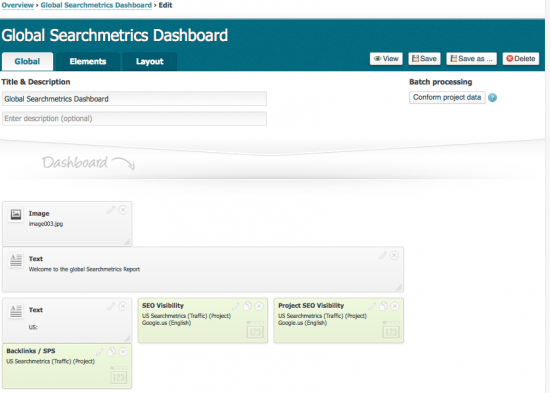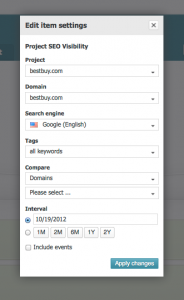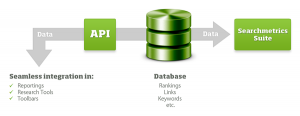In the article series on “Big Data in SEO” I guide you through the seven topics that are important for enterprise SEO. This is the last part of the series and I will be dealing with the “Management of Big Data” ‒ featuring Reports and Dashboards.
One of the biggest risks in the Big Data business is referred to as “information overload”: Too much data can cause just as much confusion as no data at all: Getting too caught up in the details and losing sight of the big picture will inevitably result in failure. Only a well-engineered reporting system can ensure that each person only knows what they really need to know.
Data protection is the key requirement…
Of course, data protection is another sensitive topic whenever Big Data is concerned. This is because each time huge data collections emerge, there is also a temptation to exploit this data for all sorts of purposes. Even as little as a website operator’s collection of keywords or benchmarks can provide a great deal of information on their strategy.
It is for this reason that we apply the principle of data minimization and at this point, the circle of this series closes. In the first part I wrote about the assignment of rights in the team: Everybody should get all data, without exception, that they need for their work. But not a single byte more than that.
Of course, this also applies to reporting. Here, the system can be fine-tuned even more: All employees without access to the Searchmetrics Suite are simply kept up to date via regular PDF reports. And these reports always include just the data needed by the employees.

…Big Data Management is the perfect solution
Yet data minimization is only one important basic principle. Other factors also play a crucial role in the development of a functional reporting system:

- Push for regularly dispatched data and remote employees: A PDF report that is sent automatically via e-mail can develop its full potential in two scenarios. The first one is, of course, when you are dealing with regularly spaced activities, where the report fulfills the function of a green light. For instance, if the top keywords are received in the editorial team’s inbox on Monday, the editors can be finished with preparing an editorial schedule by Tuesday. Other important recipients for Push data are “remote” project participants. These are employees who are not involved with SEO on a daily or weekly basis. Your attractively designed reports can help to keep them posted on the latest state of affairs, for example, on a monthly basis.
- Pull for daily work: One potential drawback of the “Push” method is, of course, the risk of a full inbox, and, after several weeks, complete unawareness of the recipient that they have received any e-mails. That’s why my advice to all who are regularly working together in a team anyway is: Pull instead of Push. Expediently grouped, custom dashboards provide readily available guidance to hard working team members. One of the advantages of the Searchmetrics Dashboards is, of course, the fact that they are always accessible under the same URL. This means that, when properly designated as a bookmark, they can be reached instantaneously at the click of a button.
- Usability and speed also play a role: Those of you who still remember the log file analysis reports from several years ago will know what I mean by this. Detailed tables stretching over several pages, which take several minutes to load, which are accessed once or twice – and only as an absolute last resort after that. This is why we enable you to make your dashboard designs as attractive and flexible as possible – to ensure that they are actually read by visitors.
- Individuality for the right eye level: While employees in your technical department would require very detailed lists of errors and notes, management employees only really need the summary and the historical development trends. The same holds true across all other knowledge areas. And this is why it is well worth compiling an appropriate dashboard for each target group (even if it only consists of a single person). Considering that this only needs to be done once, the effort is usually worthwhile.
- Commitment to the same KPIs: If the team relies on a database such as Searchmetrics, the validity of the values is beyond doubt. However, it is, of course, possible that people disagree on WHICH values are most relevant and worth pursuing to achieve the objectives. Do you wish to aim for general visibility? Or maybe leave that and go for project visibility, which is based on your pre-defined keyword set? This should be discussed and agreed at the beginning and then reported accordingly.
With these rules in place, Big Data will no longer lead to confusion in your company, but rather to a net gain in knowledge for everyone.
API or the great art of mixing data
The Searchmetrics Suite also delivers the relevant data from Adobe SiteCatalyst, Google Analytics and eTracker. But even though we do everything possible with that: The Searchmetrics data should, of course, also be represented in close association with information from other tools. Even a linked table showing rankings, traffic and the margin of individual products can be incredibly valuable to merchants.

This is where the Searchmetrics API comes into place. Using this interface, Suite customers can take their data and use it anywhere they wish to view their reports. With the easy-to-understand and comprehensively documented API you can swiftly integrate large and small datasets in your own applications. Really simple.
Plan ahead before reporting
Despite all the enthusiasm for huge amounts of data and comprehensive information: Big Data only really works well if every member of the team really knows everything that they have to know – and that they can process. Therefore, it is essential to plan your reporting very accurately and intelligently – regardless of the fact that it is only mentioned in the last part of the Big Data series.
On our website you can get the complete Big data-series as complete eBook. Download now!
- Promoting productivity: managing international teams and agencies. Large quantities of data require a very fine allocation of rights. For reasons of data protection on the one hand, but also for quality reasons: If everyone can do whatever he or she wants to, you end up not really knowing what’s inside the big data pot. The Suite allows you to perform these tasks in a simple and user-friendly way thanks to the allocation of rights.
- Quick overview: managing different campaigns in a structured way. Large companies always pursue multiple goals at one time. These goals can be pursued individually using the features of the Searchmetrics Suite, such as tagging and multi-tagging. But the Suite also lets you adapt and automate every report and every chart.
- Observing competition: learning from your competitors. Competition is sometimes the biggest surprise in online marketing. Our offline competitors are potentially only marginal online competitors, whereas our offline partners are actually our toughest competitors. We provide just the right environment in numerous data pools.
- Pick the cherries: tapping into hidden potential. It’s not always worthwhile to work on the keywords with the largest number of searches. Competition, universal search and existing ranks also play an important part.
- Improving performance: technical optimization. Sometimes even the best SEO gets muddled up when dealing with a large page. We crawl every page and report error pages and optimization potential for keywords.
- Return on investment: paying attention to the conversion. Ultimately, it’s about the money. Is a PPC campaign worth it or would the budget be better allocated to SEO optimization. What’s more worthwhile? We supply figures to help you make this decision.
- Optimizing processes: saving time and money. One employee on the team needs a daily report, another one a monthly summary. Our reports are highly flexible, relevant and can be generated with just a few clicks.
